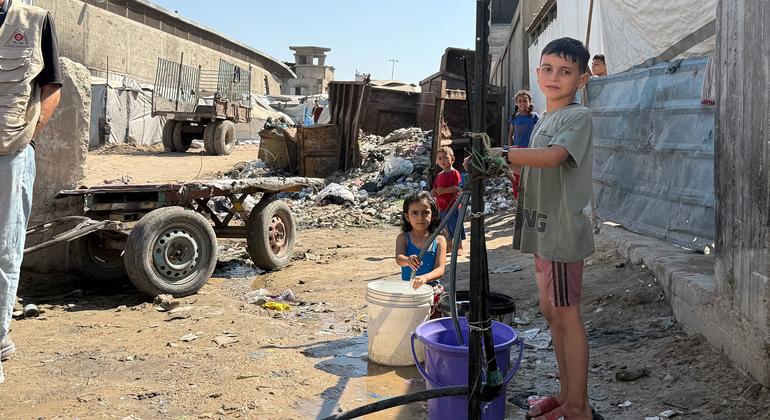Here’s the translation into American English:
The situation of children in the Gaza Strip has reached alarming levels, with over 5,000 minors diagnosed with acute malnutrition just in the month of May. According to recent data, 5,119 children between 6 months and 5 years were admitted for treatment, of which 636 face the most severe and lethal form of this condition. The shortage of medical care, drinking water, and food in the region has exacerbated a problem that seems to have no end.
Reports from nutrition centers supported by UNICEF indicate that this increase in cases of malnutrition represents almost a 50% rise compared to April and a shocking 150% compared to February, when a ceasefire facilitated the entry of humanitarian aid. In total, during the first five months of the year, 16,736 children have been admitted, averaging 112 each day. Edouard Beigbeder, UNICEF’s regional director, emphasized that each of these cases could be prevented if minimal living conditions were allowed, calling for action amid what he describes as human decisions leading to avoidable deaths.
The conflict in the region has destroyed vital infrastructure, including water, sanitation, and health systems, further complicating the fight against malnutrition. Currently, only 127 out of 236 malnutrition treatment centers remain operational due to armed conflicts and ongoing displacement orders. Diseases like acute diarrhea now account for one in four cases, further worsening the food and health crisis.
Additionally, it is estimated that 55,000 pregnant women are at risk of miscarriages and giving birth to malnourished or stillborn babies. In light of this critical situation, Beigbeder has urged Israeli authorities to allow the swift and dignified delivery of humanitarian aid through all border crossings.
The international community is also sounding the alarm about the imminent collapse of basic services in Gaza, especially after more than 100 days of a total blockade that has left health facilities in a critical state. Without the immediate entry of fuel, it is expected that 80% of intensive care units, vital for deliveries and emergencies, will be completely paralyzed. The UN Office for the Coordination of Humanitarian Affairs warns that inaction has hindered access to crucial resources and that insecurity at aid distribution centers is increasing, further complicating the situation for the population.
In this context of desperation, obtaining food has become a daily struggle for the people of Gaza, who face extremely difficult living conditions. The conditions in shelters are described as “absolutely horrendous,” and many risk their lives in search of the most basic necessities for survival.
via: MiMub in Spanish
